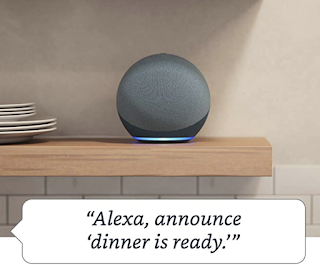Linguistics Outside of Academia

When I tell my Alexa to announce that dinner is ready, not only does this magical electronic device understand what I'm saying, but it does just that by first ringing a dinner bell on all my connected Amazon devices and then speaking my recording of, "Dinner is ready."
This is no small electronic feat. Behind all the devices we carry that understand spoken language: Siri, Google, Alexa, and more, is a team of Language Engineers using their knowledge of linguistics and human nature to improve the accuracy of our verbal commands.
I read a fascinating interview with Language Engineer, Brent Woo, on the website Superlinguo. I had never thought about linguistics being such an important part of making our artificial intelligence (AI) work the way it does. When asked, "What is your job?" this was Mr. Woo's response:
Language Engineers work on the language designs for voice assistants. When you say something funny like “let’s raise the roof” and the voice assistant can interpret that to raise its volume to the maximum level, that was likely due to an LE language design. LE look into common variations on requests, understand the failures in human-machine communication, and adjust recognition coverage for them. We work on the scale of millions of utterances a day, so this process also has to be automated to some degree.
There is so much science behind how my voice assistants work. I remember watching Star Trek as a kid and thinking the idea of talking to a computer was magical. Captain Picard could simply say, "computer," and the computer would listen and do what he said. It seemed too good to be true.
But here I am at 50 years old. I've got an Alexa connected in multiple rooms in my house. I can talk to my TV remote and it will do what I tell it to do. I have a "smart plug" so when I use it with my Christmas tree lights I can turn them on and off with just a voice command. I have a computer in my pocket that I can pull out and say, "Siri, remind me to pick up my kid at 2:00pm," and at 2:00pm I will get a reminder.
All of this is possible because of scientists. And some of those scientists just happen to be linguistic experts like Mr. Woo. They have to take their knowledge of the human language and apply it to the commands we humans want done.
When Mr. Woo was asked, "How does your linguistics training help you in your job?" he responded:
A common scenario is product or business stakeholders will request to have utterance X go to feature Y, and an LE will know from their expertise that no sane human customer would utter X to trigger Y. The LE has to present the case why that wouldn’t be a good design, and propose alternatives, and overall help the feature get better language coverage. This involves classic syntax for figuring out sentence structures and variations, and semantics for the annotation schema. Sometimes phonetics comes up when there are speech recognition conflicts or misfires!
WORKS CITED:
Superlinguo, Lauren Gawne. “Linguistics Jobs: Interview with a Language Engineer.” Superlinguo, 4 Sept. 2022, https://www.superlinguo.com/post/694502157231259648/linguistics-jobs-interview-with-a-language. Accessed 23 Sept. 2022
"Meet the Alexa Science Group." YouTube. Uploaded by Inside Amazon Videos, 5 Jul. 2016. https://www.youtube.com/watch?v=SMLuo74LHN8. Accessed 23 Sept. 2022

Comments
Post a Comment